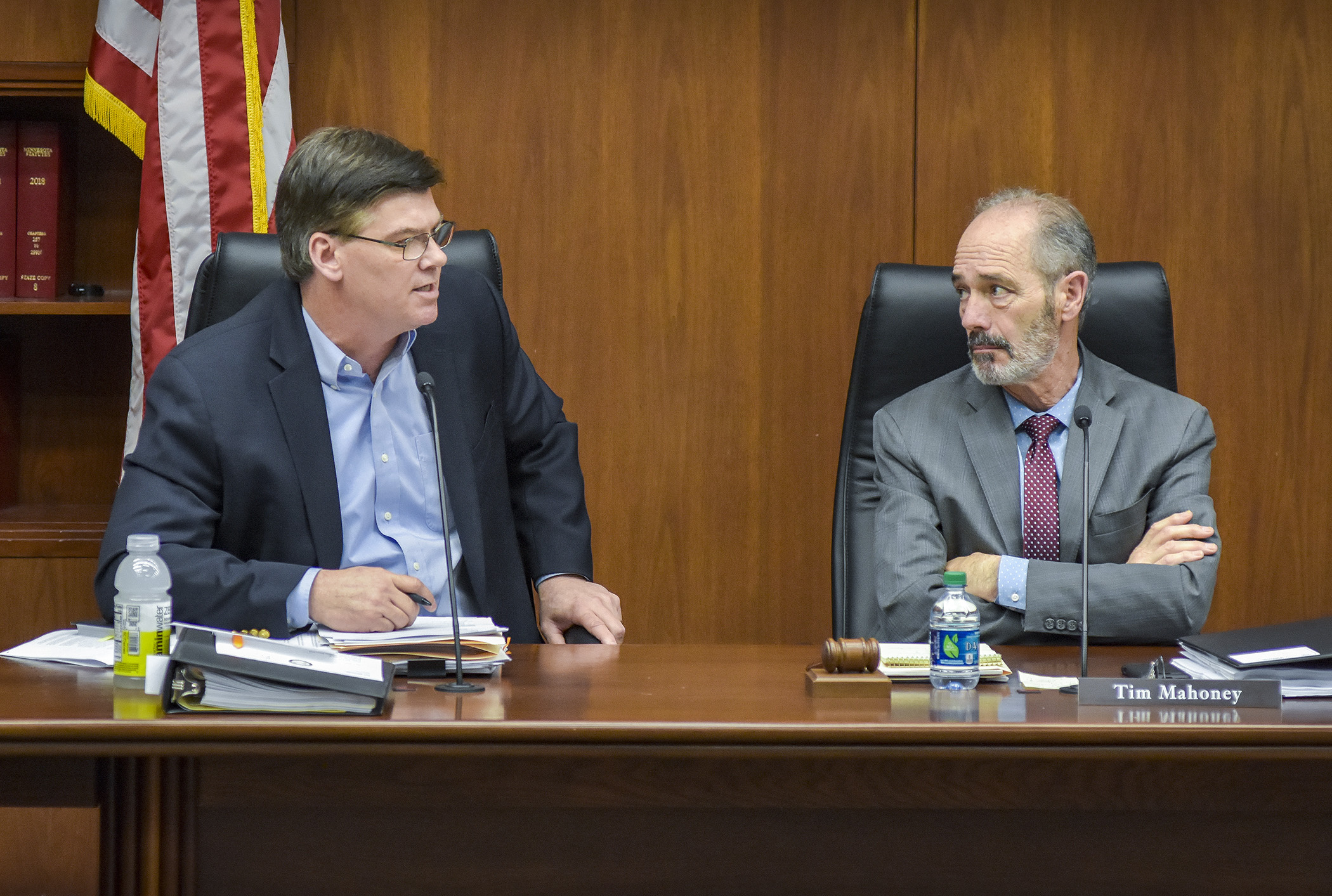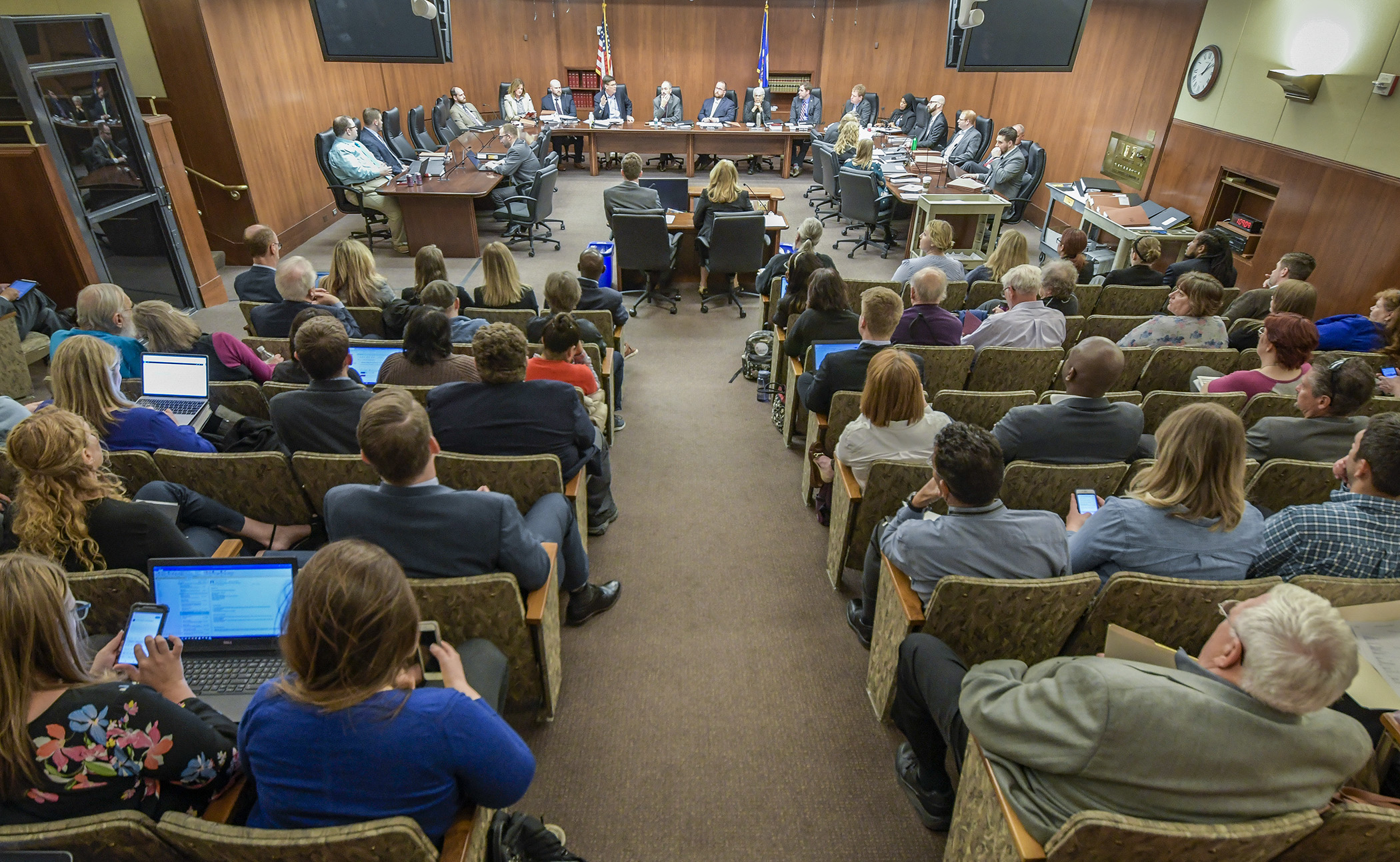A scheduling dispute, a power struggle, a walkout: Rough start for a conference committee

When workers don’t like how they’re being treated, they’ve been known to stage a walkout. And that’s what happened at the first meeting of the conference committee on the omnibus jobs bill Friday.
Upset that Senate members weren’t sufficiently consulted in the calling of the meeting and its agenda, the committee’s co-chair, Sen. Eric Pratt (R-Prior Lake), voiced his objections strongly to the other co-chair, Rep. Tim Mahoney (DFL-St. Paul).
Saying that he believed the meeting was too hastily scheduled, Pratt argued that Senate staff didn’t have sufficient time to compile information on the House and Senate bills for comparison. His displeasure and a series of testy exchanges with Mahoney culminated with Pratt leading Senate staff out the door 90 minutes into the hearing.
The meeting was intended to be informational, with members being briefed on the sections of HF2208 – a Mahoney-sponsored omnibus bill that combined the work of three House committees – that pertain to paid family and medical leave, earned sick and safe time, and wage theft. But Pratt, the only senator or Republican present, assailed the agenda, saying, “Rehashing a House hearing is not a good use of a conference committee.”
Over the course of an argument with Mahoney that covered most of the first 30 minutes of the meeting, Pratt accused his co-chair of “disrespecting my chamber,” adding “the House has turned this into a hyper-partisan show” and repeatedly citing Mason’s Manual of Legislative Procedure as backing up his stance, something Mahoney countered was more in his own favor.
When discussion did finally get down to paid family and medical leave, Pratt grilled the sponsor of the original bill on the issue, Rep. Laurie Halverson (DFL-Eagan), and Steve Grove, commissioner of the Department of Employment and Economic Development, about particulars. After over 30 minutes of questioning, Mahoney began challenging Pratt continuing his questioning without being recognized by the chair.
 The conference committee on the omnibus jobs and economic development, energy and climate, and telecommunications policy and finance bill meets May 3. Photo by Andrew VonBank
The conference committee on the omnibus jobs and economic development, energy and climate, and telecommunications policy and finance bill meets May 3. Photo by Andrew VonBankAfter some discussion of the section of the bill on sick and safe time, including public testimony, Pratt said, “You’re not allowing the Senate and the committee members to get a thorough vetting of the bills. There was nothing in the agenda that said that there was going to be a set amount of time on questions. It just goes to show that this is nothing but political theater. So, Mr. Chair, I am going to ask our nonpartisan staff to go back and start working and finish up on the bill comparisons so that we can get back to the work of the people of Minnesota. … I guess I’m done wasting my time.”
Mahoney expressed exasperation, saying, “Why don’t you just leave and play your game?” Pratt and most of the Senate staff did. The remaining members then heard more testimony about the sections of the bill on sick and safe time and wage theft, including from Labor and Industry Commissioner Nancy Leppink.
The committee is scheduled to meet again Monday, when the provisions of the bill related to energy and climate are on the agenda.
Related Articles
Search Session Daily
Advanced Search OptionsPriority Dailies
Ways and Means Committee OKs proposed $512 million supplemental budget on party-line vote
By Mike Cook Meeting more needs or fiscal irresponsibility is one way to sum up the differences among the two parties on a supplemental spending package a year after a $72 billion state budg...
Meeting more needs or fiscal irresponsibility is one way to sum up the differences among the two parties on a supplemental spending package a year after a $72 billion state budg...
Minnesota’s projected budget surplus balloons to $3.7 billion, but fiscal pressure still looms
By Rob Hubbard Just as Minnesota has experienced a warmer winter than usual, so has the state’s budget outlook warmed over the past few months.
On Thursday, Minnesota Management and Budget...
Just as Minnesota has experienced a warmer winter than usual, so has the state’s budget outlook warmed over the past few months.
On Thursday, Minnesota Management and Budget...